Are You A Vanguard? Applications Now Open
A woman bathes her child on the street in Usshertown.
This special issue of Forefront is part of The Rockefeller Foundation’s Informal City Dialogues, a year-long collaboration with Forum for the Future and Next City taking place in six rapidly urbanizing cities around the world. The project aims to foster a conversation about creating more inclusive and resilient cities. Read weekly dispatches from our cities, watch short films and engage with others at nextcity.org/informalcity.
It’s Sunday evening in the Ussher Town section of Ga Mashie, and life outside Joseph Quarteh’s house is in full swing. A group of small children dance the latest variation of azonto to the music that swells in the streets. Their mothers and aunts sit nearby on wooden benches and plastic chairs, selling fried pork and cold purewater from blue coolers. Joseph, the patriarch, is watching the football game on television somewhere nearby. When nearly 50 people live in your house, it’s easier to watch TV somewhere else.
According to a report by Global Communities (formerly CHF International, and still called that in Ghana), in Ga Mashie an average of 48 people live in each house. Which is why most of the time, especially on Sundays, families stay outdoors, where there’s more elbow room. At night, the streets of Ga Mashie are sardined with slumbering bodies – one 2010 study by CHF found nearly 3,000 people sleeping outside in an area less than one-fifth of a square kilometer. In other parts of the city, the crowding is so intolerable that people sleep on the steps of shops, even in wealthy neighborhoods. Shop owners spend their nights on the floors of their kiosks, or rent them out to others to sleep in. In the most crowded areas, where there’s literally not enough space for everyone to lie down simultaneously, people sleep in shifts.
Inside Joseph’s house, a few young women are getting ready to go out to a club. Abigail, 18, rubs shea butter on her calf while Gladys, 19, combs her hair in a corner. The room they are in is off to one side of an alley, a sort of public corridor that divides Joseph’s house in half. It is uncomfortably hot in the room, though it’s well after sundown. A pile of plastic woven mats in the corner betrays the fact that nearly thirty people share this 10-by-15-foot room.
Tonight, the girls tell me, most of them will sleep outside, in the street where it’s cooler. “What about when it rains?” I ask them. They shrug. The answer is obvious: Everyone has to crowd inside the tiny room.
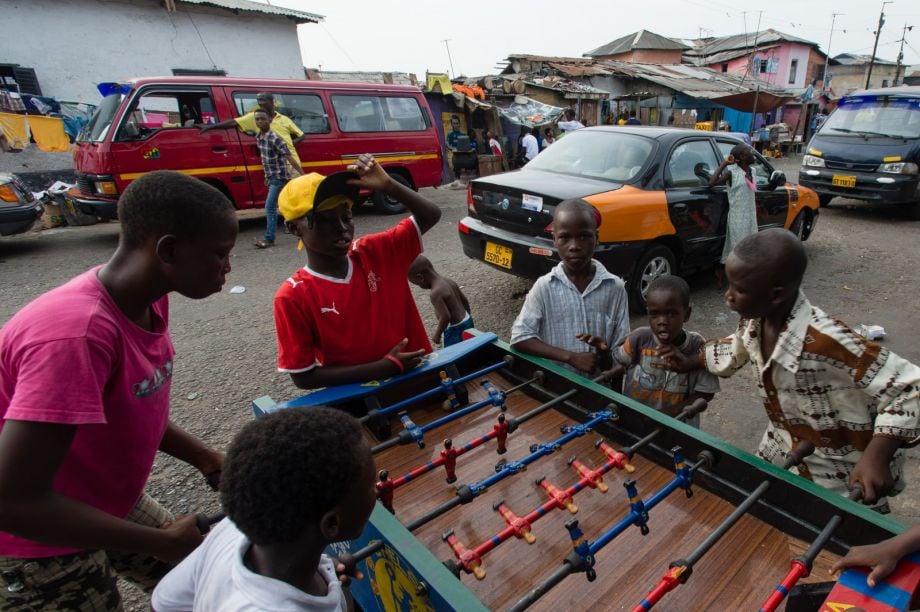
With little room for toys in most houses, children set up their games outside.
This is what life looks like in much of Accra, a city suffering from a housing crisis that’s been gathering for decades. As population growth and urban migration have swelled the city with new residents, the housing supply has not kept pace. As a result, around 90 percent of urban housing in Ghana is informal, according to a report by UN-Habitat, and 53 percent of Accra’s households occupy a single room. Meanwhile, housing costs have risen faster than income levels, while at the same time the government has systematically reduced its role in housing provision.
The result is a city where communities that barely have room to breathe are crushed up against the high walls of gated communities filled with sprawling lawns and swimming pools; where a housing market’s dysfunction is exacerbated by the fact that private developers are uninterested in creating more low-income housing even though that’s exactly what the city needs; where a rental system allows landlords to gouge desperate tenants; and where a financing model geared toward the wealthy makes it all but impossible for middle-class residents to buy a house.
Though these problems seem deep-rooted and intractable, solutions lurk just below the surface. Pilot programs led by community groups are working to densify the city, and legislation for more subsidized housing is in the pipeline. For now, however, the most effective solution that Accra’s citizens have at their disposal is each other – the strength of their exceptionally robust informal networks, which keep the crisis from morphing into chaos. Through a system of social ties forged through family and friends, the people themselves are managing to mitigate the housing shortage. In a city where many have no adequate shelter, it seems nearly everyone has a home.
At around 8 p.m. on Sunday, most of Joseph Quarteh’s family, like the rest of Ussher Town, is making the rounds at the funerals that take over the neighborhood’s streets on weekends. Seven-foot-high speaker systems bookend each funeral party, blasting Ghanaian and Nigerian hits. The smells of jollof rice and fried yam mingle in the air. A man has his arms up, a pair of tongs in one hand, dancing in front of a grill packed with kebabs. Men and women dressed in black-and-red or black-and-white cloth sit in plastic chairs, chatting and eating.
Ghana is known for its elaborate funeral rites. But in Ga Mashie, which makes up several neighborhoods in the innermost part of Accra, including Ussher Town, the city’s housing crisis means there’s no room even for the dead. As Joseph explains to me, typically a family would hold the wake in the courtyard of a family member’s house. But now, says Joseph, there’s not enough space, so funerals take place in the streets. As darkness falls and a cart rattles by carrying chairs and a giant fan to one of these funerals, people are already spreading out cloths on the pavement, settling in for the night. Later, as the funeral parties wind down, the streets will fill with more sleeping people, arranging themselves like a giant human jigsaw puzzle on the road outside. In the mornings, you sometimes find little spirals of ash on the streets, the remains of scented coils burnt to keep mosquitoes at bay. Besides the obvious dangers, the malaria-ridden insects pose another threat to Ga Mashie’s fitfully sleeping residents.
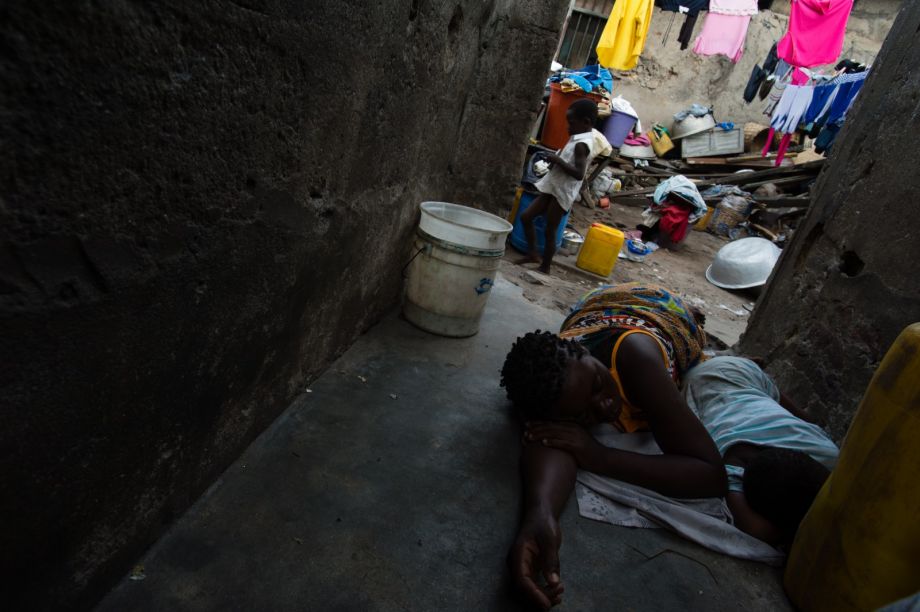
A mother and her child nap in a corridor off their courtyard.
This surreal nightly scene is borne of “sheer political economics,” says historian and former Accra Mayor Nat Amarteifio. “Land in Accra is expensive, very expensive. And housing is expensive, very expensive.” Like most cities in Africa, Accra is growing fast, swelling with rural migrants attracted by its higher incomes. But its popularity has generated higher costs of living, too. One recent report published by The World Bank (“Is Accra a Superstar City?”) put the city as the 75th most expensive in the world, between Melbourne and Houston, whose residents make ten times more money.
That means that it’s not just the poor who are squeezed out of formal housing, but the growing middle class, as well. Even though the Accra’s residents earn more than people in Dar es Salaam or Addis Ababa, the residents of those cities enjoy better housing conditions. The paradox is glaring: Ghana is home to one of the fastest growing economies in the world, yet its capital city can’t even house its own people.
There’s no single reason for this, but rather a multitude of conspiring factors. The World Bank report speculates that the roaring economy has caused land prices to spike, resulting in a “very inelastic” housing-supply market. This means that even as demand swells, not enough new units are being built, leaving the city with a need for 5.7 million new rooms by 2020. To be sure, construction is happening – booming, in fact – but it’s mostly large houses and luxury apartments, their cavernous rooms and expansive yards swallowing up precious land. Much of this high-end development is fueled by remittances from Ghana’s huge diaspora. “Every Ghanaian has a relative abroad,” says Philip Oduro-Amoyaw, Head of Strategic Planning and Research at HFC Bank. “Ghanaians culturally look back home and cherish home ownership.”
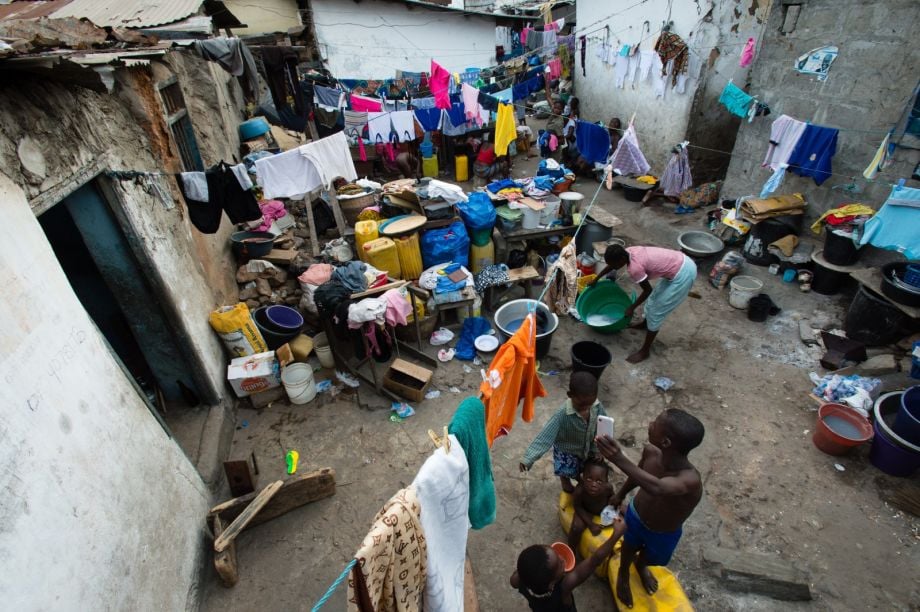
A compound shared by several households in Usshertown.
The irony is, there’s actually vacant land all over Accra, thanks in part to a traditional system of communal land-ownership that still holds sway. Half-built structures can be found throughout the city, often on the very best real estate. Many are doomed to sit unfinished for years while their titles are tied up in litigation, as multiple “owners” queue up to claim them in the overtaxed court system. Government policies make the process of land acquisition even lengthier and more expensive. Furthermore, many people build their homes over the course of many years, slowly adding cement blocks as they’re able to buy new materials and hire labor. It’s not unusual to see caretaker families who have been given permission – sometimes they even pay rent – to live on disputed land or in incomplete structures.
If the private market is half the problem, however, the public sector is the other – the government of Accra has not made affordable housing a priority in decades. “Housing is not a core business for the municipalities,” says Ellen Nsiah, Executive Director of Housing the Masses, an organization that facilitates housing reform and provides technical support for low-income communities. About 9.3 percent of all rental or rent-free housing in Accra is publicly owned, but there used to be much more. “The city has quite a history of building for the masses,” says Amarteifio. A number of workers’ housing projects were begun in the 1940s and continued under President Kwame Nkrumah as part of the State Housing Corporation, and later by the Social Security and National Insurance Trust (SSNIT) in the 1970s. But later in the ’70s, says Amarteifio, the “desiccated economy” drove more Ghanaians into urban centers, driving up housing prices. Around the same time, structural adjustment programs pushed by the World Bank and International Monetary Fund discouraged government spending on social programs like housing.
With the economy in collapse, Accra’s construction companies “went belly up,” says Amarteifio. Tenants who couldn’t pay their rent also couldn’t be evicted without serious political consequences. The State Housing Corporation went bankrupt, and the city’s housing crisis began in earnest. The experiences of this era, combined with policies that promote low-density development, have made social housing development unpopular in Accra. “The state has shifted its ideology,” says Augustine Adams of CHF International. “It’s not so much interested in housing the masses. It’s all private-sector driven now.”
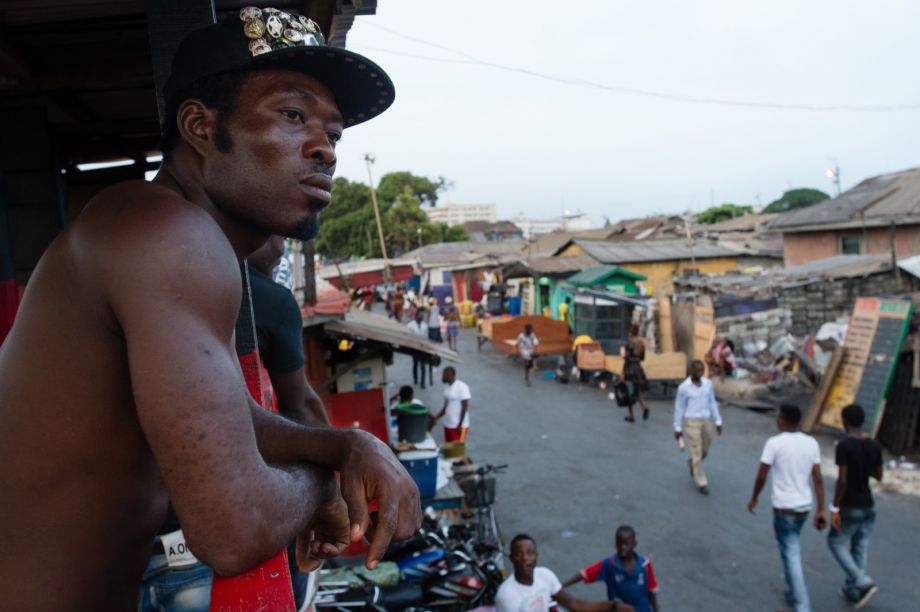
Theophilus Anonue surveys the street from the clubhouse that he and his friend Ahmed Saraku built.
“The biggest thing over the last 10 to 15 years we’ve seen are large increases in the private sector entering into the housing industry,” says Alexander Tweneboah, a private real estate developer and the Immediate Past President of the Ghana Real Estate Developers Association (GREDA). “But the majority are concentrated on the high end of the market. A few have also concentrated on the middle. The problem has been on the lower end.” Though there is plenty of pent-up demand for low-income housing, he says, the private sector has not been able to produce housing in high enough volumes and for low enough rates. Material costs, land values and the lack of infrastructure have driven up the price of construction. Cement, for example, costs twice as much in Ghana as in the U.S., and the quality is generally lower. Private developers must also often build roads, water and electricity connections at their own expense. Meanwhile, high interest rates on loans drive up costs even further. The best he’s able to do, Dr. Tweneboah says, is produce units that would be repaid at a rate of 150 Ghana cedis ($75 USD) per month. Low-income earners, however, want to pay 30 Ghana cedis ($15 USD). “The bank won’t give us money at this repayment rate,” he says.
Though Ellen Nsiah, too, cites a number of factors contributing to inadequate housing, from the problems of traditional compound construction to the high cost of imported building materials, she believes that policy and finance are the two key factors holding up the development of affordable housing. The national government, she says, should compel municipalities to provide low-income housing for the people. “Then we are going somewhere.”
But the financial system is holding up what progress could be made toward meeting the enormous demand. “The financing has now become the bottleneck,” she says. Low-interest mortgage and rental loans need to be accessible. Right now, she says, the cost of borrowing is too high, with interest rates for mortgages around 12.5 percent in U.S. dollars, and 20 percent in Ghana cedis. They would need to be half that for mortgages to be viable.
Some banks are beginning to make progress on low-cost small or micro mortgage loans. HFC Bank recently opened “HFC Boafo,” a range of banking services aimed at the urban poor. Low-cost mortgages, secured against savings, are among the products they provide. Still, Nsiah asserts that mortgages are difficult to get, and in any case are of no help to renters. And, as Philip Oduro-Amoyaw from HFC Bank points out, four out of five Ghanaians are still divorced from the formal banking sector. But some progress is being made. HFC worked with a number of NGOs to set up financial products for poor urban dwellers to improve their housing, subsidize landlords in slums to make basic sanitation improvements, and finance housing construction and mortgages. G-Fund, an initiative of the People’s Dialogue on Human Settlements and the Ghana Federation of the Urban Poor, was started in 2005 and gives members of their community savings group access to capital for, among other things, home improvement, construction and down payments for mortgages, all at rates well below market prices. Their goal is to improve the lives of at least 100 million slum dwellers by 2020.
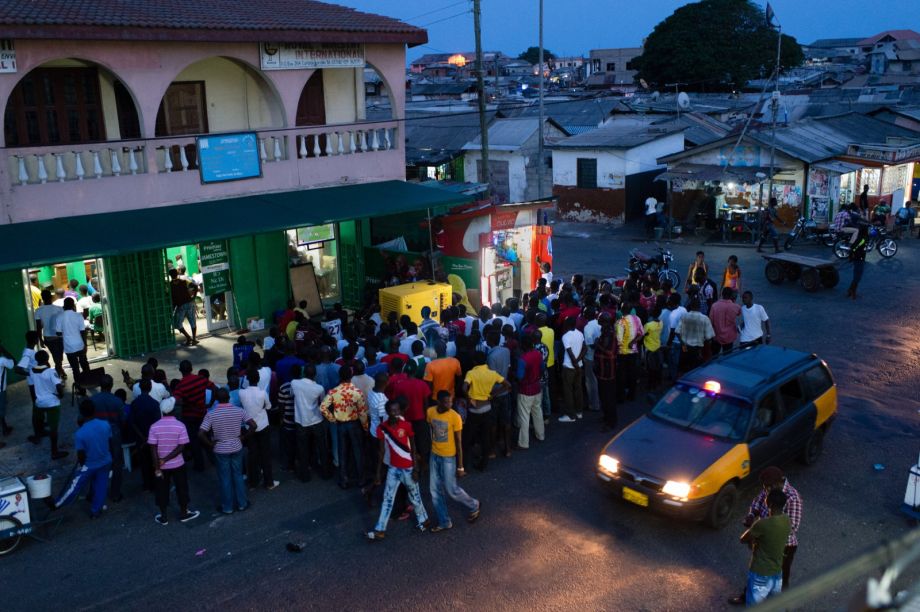
A crowd in Usshertown gathers around a TV set to watch a football match.
On the supply end, though, no one seems to be taking the bait. NGOs like CHF International and UN-Habitat, and a few individuals in industry and academia, are the only ones who have taken a serious interest in low-income housing development, and they typically have money only to complete small-scale pilot projects in an attempt to prove the model. “Some of us have a bit of a social conscience,” says Dr. Tweneboah, who is leading one of these projects. “And that’s why some of us have taken it on.” Nsiah just shakes her head when I ask if there are any companies getting into low-income housing development at a larger scale. A few are theoretically interested, she says, but none are making a move.
“I would be extremely surprised to find anybody who is actually investing in low-income housing,” Amarteifio says. “I would be pleased to see it because we cannot keep creating kiosk cities.”
“As our lives change,” says Nsiah, “we should change the way we live.” She is referring to the common Ghanaian dream of building – not just owning, but building – a home. It is a mark of pride, of success in life, and something can be handed down to children and relatives. “It’s like a status symbol,” says Nsiah. “I built a house.”
This dream can be seen playing out in two very different ways in Accra: In its middle- and high-income neighborhoods, and in the “pocket slums” wedged between them. Trasacco Valley, the highest-priced real estate in the city, is a classic gated community. Peering in through gaps in the walls from the outside, I’m surprised by the little pang of jealousy even I feel looking in. Unlike some of the large but often gaudy-looking houses in nearby East Legon, these homes look stately and refined. Elegant landscaping, tasteful design, lush plant-filled balconies – I can imagine the gardens and sparkling swimming pools in the backyards.
On a stretch of bare land between this gated community and the Accra-Tema Highway, an informal settlement of tiny one-room shacks is home to over 500 people. The houses are built right up against the walls of Trasacco Valley – walls that were built by the hands of the informal settlers themselves to keep them out of this little slice of paradise. Seraphim Apraku, 24, and Prica Bakuyeya, 26, are sisters who have lived in the informal settlement with their husbands for nearly four years. They moved here from a village in the Volta Region, a few hours’ drive northeast of Accra. Their water source is an open pond, supplied by drainage that runs under the highway from an industrial area on the other side. They had no electricity until recently, when some of the families hooked up illegal connections. There are no toilets or even latrines; they use the “pan latrine” system or go in the bush.
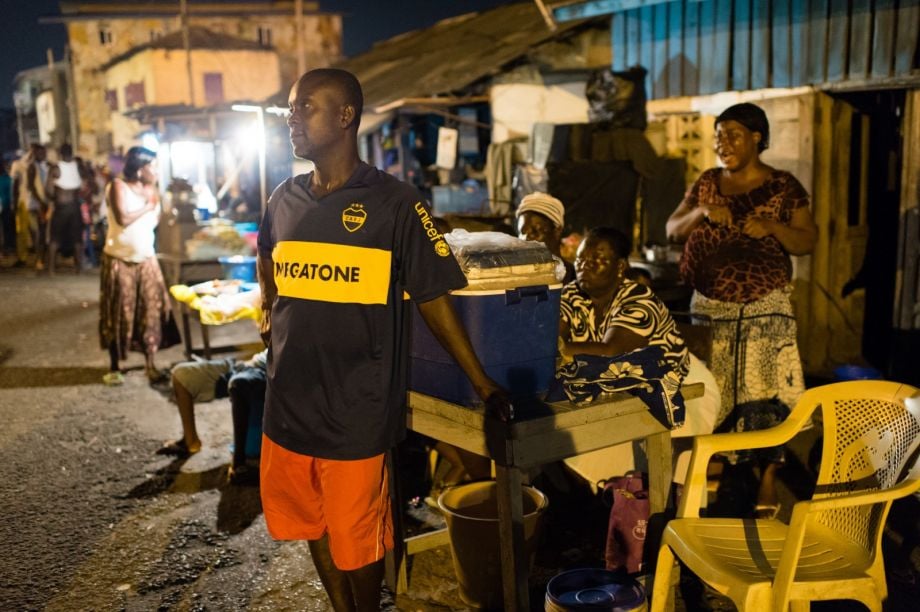
Joseph Quarteh stands in front of the house that he shares with almost 50 people.
The workers’ pay, they say, is not enough for them to afford rent elsewhere in the city. Though the company doesn’t mind the workers living here, the sisters say they’ve been told that “the women should go and the men should stay.” I am reminded of the mining camps in South Africa, famous for separating workers from their families, which gave rise to prostitution and broken homes. According to the sisters, the Trasacco company occasionally sends the police to tell them to destroy the newer structures they have built. When I ask them how they feel about living like this adjacent to some of the most sumptuous houses in the country, they tell me: “We feel like we are nobody.”
These are the kinds of stories you hear when you start asking people about their housing situation in Accra, stories of improvised solutions that few would consider adequate. A taxi driver I know well, Immanuel, described for me his spacious and relatively inexpensive house – in Kasoa, two hours away from Accra and owned by one of his sisters. You meet people like Immanuel all the time, of a wide range of income levels, living well beyond the city’s borders, giving up four hours of their lives each day to get in and out of the city. And that’s if they can afford the commute. Alice, a purewater seller whose closet-sized shop was until recently located at 37 Station, a major transit hub in northern Accra, has to sell at least ten to fifteen wholesale-sized bags of purewater in a day just to make enough profit to pay the five cedis ($2.50 USD) roundtrip to her home in Kasoa. She often stays with a friend in the city since the trip is so long and expensive. She’d like to have a room in Accra, but she can’t afford the rent.
The rent. This is a central struggle for those who cannot or no longer want to live in overcrowded family homes. Back at Joseph Quarteh’s house, I ask Christiana, one of his relatives, who at 28 is married with two children, why she still lives in her family house. She and her husband have been saving for the rent on a small one-room apartment in a compound house in Maamobi, a poor neighborhood just north of Nima. They will have to pay two to three years of rent in advance. This is standard practice among Accra’s landlords, who have an advantage in such a tight market. Evictions with very little notice are common. Dr. Ohene Sarfoh, director of the Ghana Urban Platform, describes fights he’s seen break out at the Rent Control Department between tenants and landlords.
Yet despite the hardships peppered throughout these stories of housing woes, something stands out about them: Everyone telling them has, if not a house, at least a place to sleep at night. It’s a quirk of the crisis that can be traced back to the strong informal networks that exist in Ghanaian culture – in a city long besieged by a housing shortage, homelessness is only just now becoming a problem.
“Is it true,” I ask Solomon Tetteh, a young activist and scholar from Ga Mashie, “that there’s no word for ‘homelessness’ in Ghanaian languages?”
We are sitting in a small bar at the edge of Ussher Town that in a few hours will transform into a thumping party spot. A waitress is putting plastic chairs and tables out on the street, which will soon be crammed with young people dancing, drinking, eating. Tetteh looks thoughtful. “Yes,” he says, “I think that’s true.”
I was intrigued by the idea that homelessness is a foreign concept in a city apparently suffering from an epidemic of it. An acquaintance of mine who studies homelessness in Accra had told me that not having a place to sleep is not the equivalent of Western notions of homelessness. “Homeless” people from families outside Accra do have a home – in their family village. When they come to Accra, they find a place to stay, with family or friends if they can, or in some kind of improvised housing if they can’t. This is one of the oddities of housing in Ghana, and it hints at a complex set of cultural ideas about land and shelter that make fixing the situation about more than good policy and adequate financing. Though there is not enough housing in Accra, says Ellen Nsiah, very few people don’t have a place to sleep.
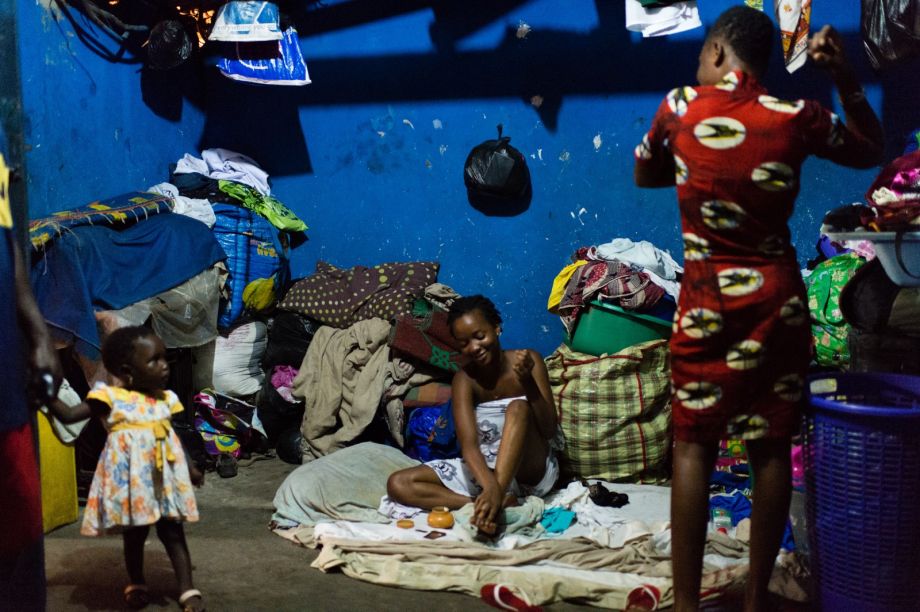
Roberta and Abigail Quarteh get ready for a night on the town. They share this room with 25 extended family members.
This is further confirmed by the fact that, according to census reports, nearly one-third of Ghana’s urban households don’t own a dwelling or pay rent of any kind. In Ghana, as in many African countries, the culture of obligation among the extended family system is strong – some argue that the failure of states to provide social assistance has in fact strengthened these ties. In the 1980s, when Nigeria ejected Ghanaian migrants en masse, international bodies predicted a refugee crisis back in Ghana. None emerged, a fact that has been attributed to extended families absorbing the returnees. In urban Ghana, these informal networks have also absorbed a great deal of cities’ population growth. “The family house system in urban Ghana,” says the UN-Habitat report, “is the social safety net that prevents homelessness from being much of a problem in Ghana.”
Crowding, though, is becoming worse and worse. People endure inadequate sanitation. Some even live in converted bathrooms. And as urban areas balloon with migrants, the family housing system is breaking down, unable to absorb more than it already has. Still, even those who are forced to improvise, renting space in kiosks and courtyards, often do not see themselves as homeless. “Until recently,” says the UN-Habitiat report, “it could be said that homelessness was an unknown concept in Ghana. [E]veryone has somewhere, a family house in a city or village, which, if they have to go there, people have to take them in.”
This is a double-edged sword. The fact that people are willing to squeeze fifty family members into a dwelling means, in part, that “there’s not an urgent push for the government to get behind affordable housing,” says Dr. Sarfoh. “Housing is not seen as a right that you pursue.”
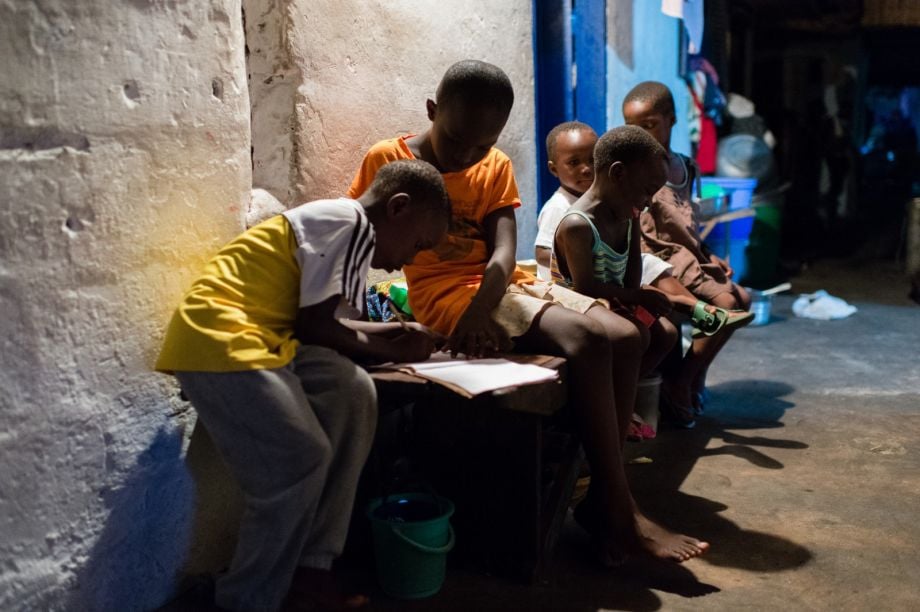
Children finish their homework in an alley between family dwellings.
In a place like Ga Mashie, where social networks are especially thick because of the Ga people’s long history there, everyone has a home, but no one has a decent home. Here, as the population has grown, the families have divided and subdivided rooms in their compound houses until dozens of people can claim ownership of a single room. (“Instead of landlords, you have roomlords,” Augustine Adams told me.) Those who can make enough money often leave, while the poor stay behind, hoping to scrape together the cash to rent their own place. But even though leaving seems like the only option to improve their quality of life, many in Ga Mashie are loathe to abandon their dense networks of family and friends.
Take Ahmed Saraku, a young 20-something boxer who I met in the clubhouse he and his friends built to watch local football matches. Saraku says he wouldn’t want to live anywhere but Ga Mashie. Despite the crowding and other challenges, I can see why. The street funerals and public activities – watching football around a small square, gambling and chess-playing, young men and women parading down the streets – add a certain character and charm. In a city where there is very little apparent public life, the liveliness of Ga Mashie’s party-filled streets is a welcome contrast to forbidding walls and empty, locked up “parks” in other parts of Accra. But this public life provides far more than just charm – the social exchanges strengthen bonds of friendship and kinship that people rely on for survival.
But Saraku also believes in the need for change. He tells me he convinced his grandmother to participate in a plan, initiated by CHF International and now being run by the Ga Mashie Development Agency and UN-Habitat, to build mixed-use multi-story structures in Ga Mashie that would ease the crowding. Investors would build the buildings and share rental income from the commercial and residential spaces with the families. After 25 years, the contract would expire and the families would retain all the ownership rights to the building.
Saraku’s grandmother’s initial reluctance wasn’t just fear of change. The peculiar set of land issues that arise from traditional inheritance practices have created an unusual dilemma for the Ga people, whose land at the very center of Accra should be some of the most valuable in the country. But because of the cultural tradition that says your family house is communally owned, selling or leasing land is extraordinarily difficult. Multiple people claim a stake in these houses, and decisions must be made by consensus. Plus, most of the land owned by these families isn’t registered with the government (a prerequisite to formal building); instead, it’s owned under the traditional authority, the Ga Mantse. Complicating matters even further, ancestors’ bodies are buried in courtyards, giving the physical structures spiritual significance.
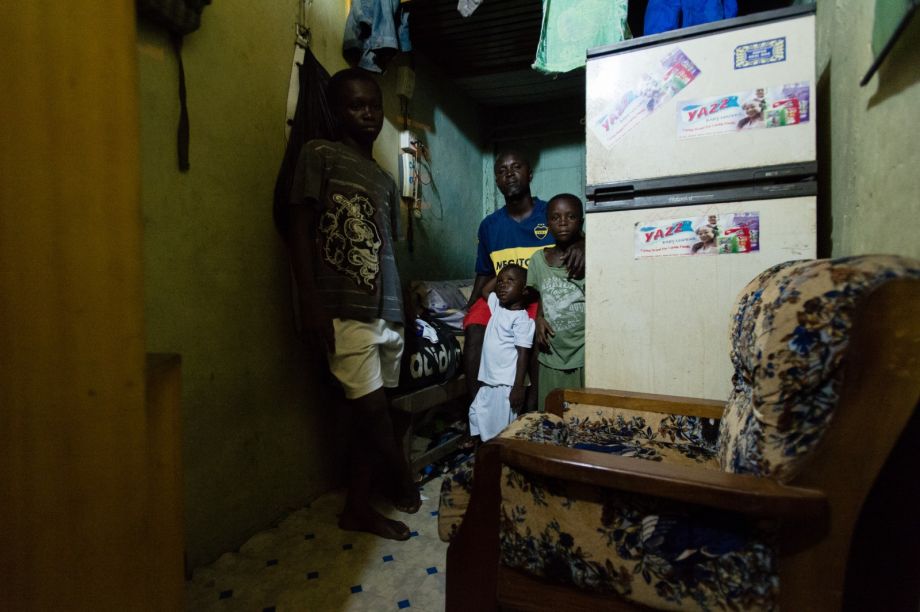
Joseph and three of his sons in the room they share with his wife and another son. Sometimes up to nine people sleep in this room.
The CHF International plan holds innovative solutions to these issues – for instance, registering the land under the name of a common ancestor, essentially creating a family trust. After lengthy discussions with the families and traditional authorities, many families, like Saraku’s, have agreed to formalize their ownership in this way. Honorable Emmanuel Botchway, an Accra Metropolitan Assemblyman for Ussher Town, says that the young people of Ga Mashie, “who have gone to school and acquired knowledge,” have been advising the elders and traditional authorities, urging them to participate.
But will they get funding? As Solomon Tetteh and I walked through town, we spoke with a number of people who, initially reluctant, had agreed to be part of the project and were now concerned that no ground has been broken. Tetteh, who has been an ambassador for the project, explains that they are looking for investment. Finance, the bottleneck, is holding things up yet again.
“There comes a time in the life of a modern city,” journalist Roman Mars recently began his podcast, 99% Invisible, “when it begins to grow up. Literally. If there are a lot of people in one place, it just makes sense for us to stack ourselves on top of each other.” Or, as Alexander Tweneboah puts it, “We need to start considering density.”
With a lack of affordable options at the city center, it’s no surprise people are moving to suburbs and sleeping in kiosks. Initiatives like the Ga Mashie housing project are attempting to densify the city. And densification is indeed happening, but, as Dr. Sarfoh says, “None [of it is] addressing low-income needs.” Cities in many other countries, he says, have laws compelling private developers to provide low-cost housing along with their high-income developments. The government in Singapore, says Dr. Tweneboah, started building six-to-eight-story buildings in the 1960s. “Now,” he says, “they’re knocking them down and building 10-to-15 stories. We haven’t even started yet.”
Densification is one possible future for Accra, but as is clear from the stalled Ga Mashie case, it’s not easy to manage. Financing, securing land ownership and temporarily relocating skeptical occupants are all challenges. Dr. Tweneboah, though, says that densification of the inner city is not impossible. “Show that it is possible and profitable,” he says, “and investors will come.”
Another option, of course, is sprawl. “Most cities grow organically,” says Tweneboah, “and you cannot stop the growth.” Though it’s far from ideal, even this urban model can be managed to promote a type of density. For example, loans could be given for home completion, especially for compound houses, in which so many Accra residents rent rooms. These compound houses are, effectively, a type of informal densification, since several households often occupy each one, whereas formal private developers prefer the single-family bungalow style. As slums from Mumbai to Nairobi have proven, low-rise doesn’t necessarily mean low-density.
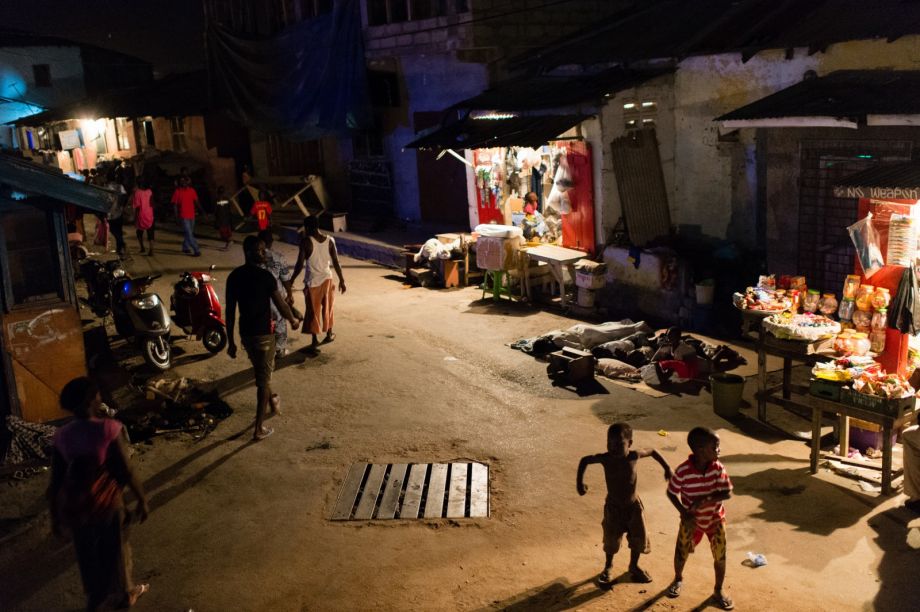
A family sleeps at the edge of an intersection while children play nearby.
Meanwhile, slum upgrading can improve the living conditions of those who dwell in the larger slums. This is already being done sporadically, often with community organizations, such as Mother’s Club in Nima, partnering with NGOs. CHF International, for example, has turned its attention to slum upgrading, and Ghana’s new Urban Policy Framework concentrates on providing toilet facilities, water access and loans to improve existing structures.
Formal densification, in the form of tall buildings and flats, if it is to be undertaken, will take serious commitment and coordination, especially in places where land tenure is not as straightforward (relatively speaking) as it is in Ga Mashie. One project, in Amui Dzor, a slum neighborhood in a suburb of Accra called Ashaiman, suggests it can be done. The project was part of UN-Habitat’s Slum Upgrading Facility, and was undertaken in cooperation with the People’s Dialogue on Human Settlements and the Ghana Federation for the Urban Poor with funding from the Gates Foundation. Alex Tweneboah is chairman of the project. They negotiated with the local traditional authorities to provide the land for a minimal fee in exchange for a stake in the project. It is similar in design to the proposed Ga Mashie project: Mixed use with commercial and residential space that will both provide better quality housing for residents and income for investors. On land that was once occupied by nine families, 31 families now live. The building has private toilet facilities and public toilets for community use.
But the project nearly failed, stalled, once again, by finance. This is so often the sticking point, and with Ashaiman, as in many cases, it boils down to the conservatism of the Ghanaian market. UN-Habitat, in order to get private funders to invest in the project, had to source funding as a credit guarantee to reduce the risk the investors took on. According to Dr. Sarfoh, who was also involved, “The market is so conservative that in the end we were providing a cash guarantee” — that is, their funders had to pledge to to pay back 100 percent of any investment not returned. A comparable project in India, he said, was able to get a credit guarantee as low as 10 percent. “A 100 percent guarantee is not good enough,” says Ellen Nsiah. “We need financial institutions to be prepared to work with low-income earners.”
And the markets need to be encouraged to finance housing projects. “We have the second-highest interest rates in Africa,” says Dr. Tweneboah. “The fifth-highest in the world.” In part, this is probably because the government maintains high interest rates to keep inflation in check. In addition, says Dr. Sarfoh, “mortgages [were] a very minimal asset” until recently, when the Home Finance Company (HFC) was created in the early ’90s. There are a number of monetary policies and incentive schemes the government could implement, he says, that would lower interest rates for home financing.
A fundamental shift in the view of housing has to take place at a government level, says Dr. Tweneboah. “The problem is that governments in the past were misconstruing housing. They all see housing as a capital expenditure item, but not a revenue item. But if you look at the dynamics of the housing industry, it actually creates revenue.”
There are nascent signs that the government is starting to get this. A National Finance Facility in the legislative pipeline will, if it passes, help to subsidize housing projects and provide further credit guarantees. This facility will, according to Nsiah, source funding and lend to cooperative bodies, agencies and social housing institutions to develop low-income housing projects. If modeled on or supporting the People’s Dialogue’s G-Fund, this could be truly successful. As the UN-Habitat report states, “Urban poor funds, which put money under the control of and behind the urban poor, are a sure way to address and scale up housing and poverty reduction solutions.”
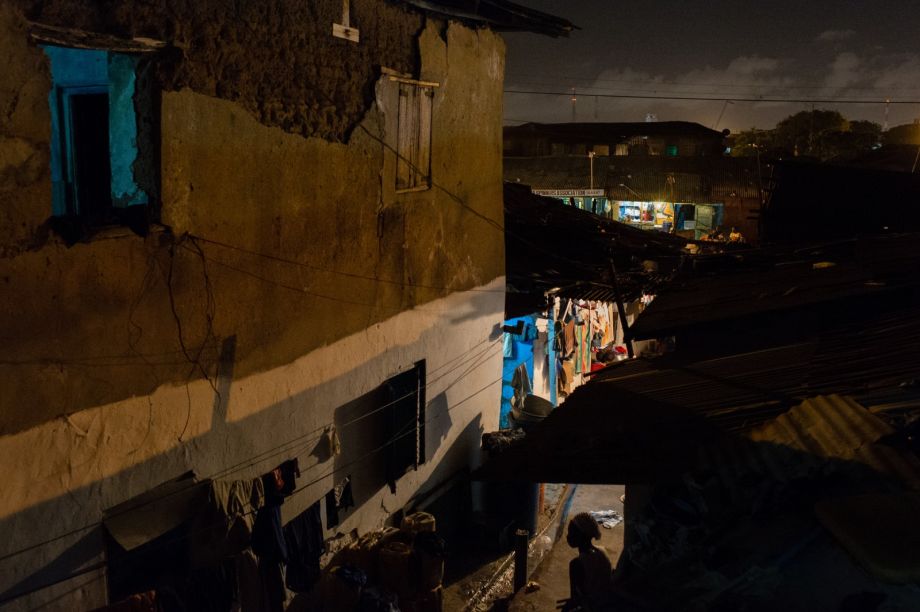
An old adobe home rises above newer buildings and ad hoc extensions in Usshertown.
The Ashaiman project, Dr. Tweneboah tells me, “can be replicated, but it must be subsidized.” Nsiah agrees. Once these kinds of projects, with appropriate subsidies in the form of loan guarantees, are shown to be profitable, the private sector will follow suit.
The Ashaiman project, like the G-Fund, was led largely by both the People’s Dialogue on Human Settlements and the Ghana Federation for the Urban Poor. Both are affiliates of Slum Dwellers International, which rose out of South African activism. Singapore, Dr. Tweneboah’s shining example of urban densification, shows that government-led housing development can work; with its housing policies, that city has attained 90 percent home ownership in sixty years. But in Ghana, where public housing projects have fallen out of favor and the private sector has little incentive to enter the low-income market, perhaps what is needed is a push from below.
“We need to create an opportunity for sea change in government policy orientations,” says Dr. Sarfoh, “to try to create a groundswell of activists pushing for affordable housing, for inclusivity. In South Africa, consistently, the low-income have a voice… Shelter is a fundamental human right and the state has a critical role.”
The future of housing in Accra, then, hangs in the balance. The financial environment is difficult, the public is being squeezed out and both the public and private sectors are apparently divested from low-income housing development. If Accra’s residents are to have a decent standard of living, real leadership is necessary.
“It’s not impossible,” says Amarteifio, “but it will take a leap of imagination on the part of many people to design new possibilities.”
Our features are made possible with generous support from The Ford Foundation.

Sharon Benzoni has worked as a journalist specializing in the urban informal sector and social innovation. She was co-founding editor of Innovations Online, before which she contributed to Next City, primarily as the Accra-based blogger for the Informal City Dialogues. She has also worked as a consultant and researcher on projects focused on climate change, human rights and social entrepreneurship. Previously based in Accra, Ghana, and New York City, she now lives in Bologna, Italy. She is an MA candidate at Johns Hopkins School of Advanced International Studies.

20th Anniversary Solutions of the Year magazine